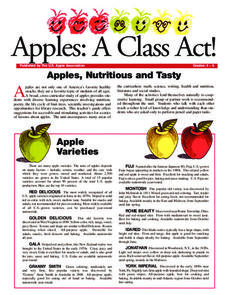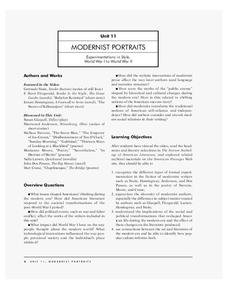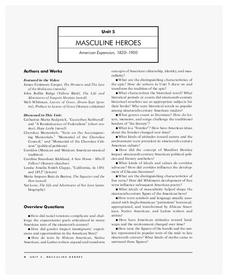Los Angeles Unified School District
Why Is the Declaration of Independence Important?
Fair or unfair? To begin a study of the American Revolution, class members review the treatment of the people of the American Colonies by the King of England and decide which were fair and which were unfair. Class members then annotate a...
US Apple Association
Apples: A Class Act! (Grades 4–6)
Middle schoolers have a bushel of fun as they engage in activities and research core facts about apples. Packed with suggestions for in-class activities and out-of-class research, the colorful 6-page packet is sure to satisfy hungry...
Roald Dahl
Charlie and the Chocolate Factory
You can't read Roald Dahl's Charlie and the Chocolate Factory without craving the rich treats described in Dahl's vivid prose. Young writers try their hands at sensory language with a lesson plan that prompts them to write about their...
PBS
Martin Luther King Jr.: Civil Rights Leader
Expand class members' appreciation of the work of Dr. Martin Luther King, Jr. A powerful resource examines King's speeches, writings, and actions that reveal his deep commitment to a nonviolent approach to Civil Rights. Learners watch a...
PBS
Malcolm X: Minister and Civil Rights Activist
Any study of the leaders of the Civil Rights Movement would be incomplete without an examination of the life of Malcolm X. Class members view a short biographical video and analyze primary source documents to gain an understanding of the...
Annenberg Foundation
The Search for Identity
Discover how writers express identity in their writing. Learners explore how issues of identity surface in the literature of minority writers. Scholars watch a video, read and discuss biographies, conduct research, engage in creative...
Annenberg Foundation
Poetry of Liberation
How do writers use words to protest injustice, challenge the status quo, and shape their own identities? Individuals watch and discuss a video, read author biographies, write poetry and journals, develop a slideshow, and complete a...
Annenberg Foundation
Becoming Visible
The television and interstate highways both came of age in 1950s America. Scholars use film, text, and discussion to explore how these and other cultural icons shaped the literature of the time. Pupils also create a family history...
Annenberg Foundation
Migrant Struggle
The American Dream is a goal that many pursue, but is it truly attainable for all people? An in-depth lesson explores the plight of migrants in twentieth-century America. The resource includes a video and author biographies and...
Annenberg Foundation
Modernist Portraits
How did literature reflect people's attitudes in post-World War I America? A lesson explores the topic using a variety of activities. Individuals watch and respond to a video; read author biographies and engage in discussion; write...
Annenberg Foundation
Rhythms in Poetry
Rhyme, rhythm, free verse, imagery: Do these words describe poetry, or jazz music? The answer is both! A resource explores these similarities as scholars watch a video, engage in discussion, read author biographies, write poetry and...
Annenberg Foundation
Social Realism
Many American writers in the late nineteenth century wanted their writing to reflect real life. Individuals watch and discuss a video, read and explore author biographies, write a journal entry and a poem, and complete a multimedia...
Annenberg Foundation
Slavery and Freedom
How do nineteenth-century texts by African American and Native American writers contribute to the country's ideals of freedom and individuality? Learners explore the topic by watching and discussing a video, reading biographies, writing...
Annenberg Foundation
Masculine Heroes
What were the driving forces behind American expansion in the nineteenth century, and what were its effects? Scholars watch a video, read biographies, engage in discussion, write journals and poetry, draw, and create a multimedia...
Annenberg Foundation
Spirit of Nationalism
What were the virtues and values that helped form America? Pupils watch and discuss a video, read biographies of early Americans, chart the differences between early American religious movements, write journals and letters, draw, and...
Digital Public Library of America
Teaching Guide: Exploring Little Women
Louisa May Alcott's Little Women is a literary masterpiece as well as a timestamp of the formative mid-nineteenth century in America. Using a primary source set of photographs, letters, and portraits, readers discuss the ways...
University of Kansas
Newspaper in the Classroom
Newspapers aren't only for reading—they're for learning skills, too! A journalism unit provides three lessons each for primary, intermediate, and secondary grades. Lessons include objectives, materials, vocabulary, and procedure, and...
Annenberg Foundation
Utopian Promise
Scholars learn all about the Puritans in the third installment of a 16-part lesson series. After watching a video, they read and discuss biographies of Puritans and Quakers from American history, write journal entries and poetry, and...
West Virginia Department of Education
Intelligence of Authentic Character - News Coverage and John Brown's Raid
The resource, a standalone, shows how news coverage of John Brown's Raid began when the event happened and how that reporting shaped perception in West Virginia history. The resource includes interesting anticipatory discussion...
iCivics
Step Two: The News and You
With so many news resources, scholars likely feel incredibly confused about what the news means. Pupils participate in reading activities, fill out graphic charts, answer questions on worksheets, and complete a quick write activity.
Constitutional Rights Foundation
How the First State Constitutions Helped Build the U.S. Constitution
Did you know that the United States Constitution was adopted after many state constitutions were already in place? Young scholars examine facts about the influence of states through an informative and interesting resource. Groups then...
Constitutional Rights Foundation
Sam Houston: A Study in Leadership
Learners read a short excerpt from a speech by Sam Houston and answer corresponding questions as well as engage in additional activities, including writing a persuasive essay and discussing topics in small groups. The resource helps lay...
Smithsonian Institution
Who's in Camp?
Pupils complete readings, a group activity using cards, and a writing activity to better understand people's lives during the American Revolution. The resource emphasizes people such as the militiamen, women, officers, and children,...
iCivics
Step Nine: Action Campaign
It's time to take action! Learners strategize their action campaigns by using the resource and past brainstorming activities from the series that help them pinpoint problems in their communities. They use included templates to get the...

























